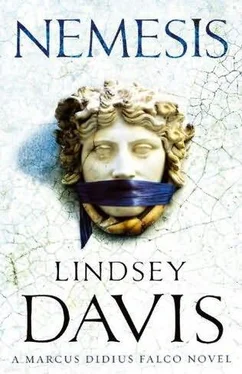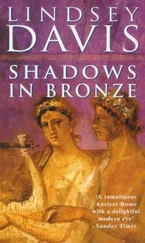Lindsey Davis - Nemesis
Здесь есть возможность читать онлайн «Lindsey Davis - Nemesis» весь текст электронной книги совершенно бесплатно (целиком полную версию без сокращений). В некоторых случаях можно слушать аудио, скачать через торрент в формате fb2 и присутствует краткое содержание. Жанр: Исторический детектив, на английском языке. Описание произведения, (предисловие) а так же отзывы посетителей доступны на портале библиотеки ЛибКат.
- Название:Nemesis
- Автор:
- Жанр:
- Год:неизвестен
- ISBN:нет данных
- Рейтинг книги:5 / 5. Голосов: 1
-
Избранное:Добавить в избранное
- Отзывы:
-
Ваша оценка:
- 100
- 1
- 2
- 3
- 4
- 5
Nemesis: краткое содержание, описание и аннотация
Предлагаем к чтению аннотацию, описание, краткое содержание или предисловие (зависит от того, что написал сам автор книги «Nemesis»). Если вы не нашли необходимую информацию о книге — напишите в комментариях, мы постараемся отыскать её.
Nemesis — читать онлайн бесплатно полную книгу (весь текст) целиком
Ниже представлен текст книги, разбитый по страницам. Система сохранения места последней прочитанной страницы, позволяет с удобством читать онлайн бесплатно книгу «Nemesis», без необходимости каждый раз заново искать на чём Вы остановились. Поставьте закладку, и сможете в любой момент перейти на страницу, на которой закончили чтение.
Интервал:
Закладка:
One batch appeared new. They had been carved to the same model, but with different arms or helmets. I was not surprised. Jobbing sculptors regularly provide a basic figure in an old-fashioned toga, then let you commission a true-life head of your grandaddy at a cut-price rate. So why not cloned dignitaries for an amphitheatre?
I counted them. One hundred and eleven. Jupiter! Pa had cornered the market. Trust him. The Flavian amphitheatre would be virtually: statues courtesy of Geminus. No wonder that creep Cluvius wanted me to step aside and let him muscle in.
I gave instructions that the statues were to be brought up to Rome using -whatever haulage system Geminus had put in place. 'And I want to see a hundred and eleven arrive. A hundred and twelve will prove to me that you are really conscientious.' My humour was lost on the steward. Foolish; if he failed to notice my jokes, he could end up at the slave market.
'I could stay here to supervise,' volunteered Albia.
'No thanks.' I was not giving her a chance to bolt. 'Lass, if you want to run away, check logistics with me first. For a workable escape you need a plan, a budget, detailed road maps, a stout stick, proper footwear and a good hat.'
'You are no fun, Marcus Didius.' Albia openly acknowledged that I read her well. 'I want to go back to Britannia.'
'No.'
'Helena's Aunt Aelia would let me stay with them – -'
'I said no, Albia.'
On to the next stage of our trip.
We could take the coast road down to Antium, a straight run but a poor track, all dreary dunes and sandflies, or we could go by sea. For that we would have to go up to Ostia, almost ten miles in the wrong direction, then the misery of a major trading port, followed by horrible seasickness for me. I opted to continue by cart, south down the Via Severiana, maybe fifteen miles. It only took a day, though it was a long hot one. We then stayed at a mediocre inn. It looked over a sea packed with delicious wildlife, yet the dish of the day was week-old eggs. Even my omelette was tough.
Next morning we tried to find the statue-sellers. Gornia was right. Their house was locked up, with nobody there. Not even a watchman answered our knocking. Albia tried to climb in from a balcony but the place was well shuttered.
I made standard enquiries. Primilla and Modestus had kept to themselves, as prosperous middle-rankers often do. They had a substantial home on the seashore, no obvious financial worries, no ugly rumours about why they did a flit. None of the neighbours had seen them for months or knew where they had gone. True, the neighbours shied away from my questions, though this was a town where imperial celebrities had long clustered; people were discreet.
Antium was once the capital of the Volsci, who tussled with Rome over a long period in the remote past. Once it became ours, the city lay far enough from Rome for men of means, wanting to avoid riots and creditors, to favour it as a retreat. Palatial villas lined the shore. Cicero owned a grand place. The disgustingly rich Maecenas had a house. The old imperial family, the Julio-Claudians, had a particular liking for this spot. It was at Antium that Augustus received formal acclaim as Father of his Country. Caligula and Nero were born here; Nero founded a veterans' colony and created a new harbour.
The new Flavians were bound to arrive on this part of the coast soon. Land agents must be keeping lists of suitable homes for up-and-coming Caesars whose pocket money came from the spoils of war.
This was a superb location for commercial dealers. The town had a slightly dusty, off-season look but it could easily perk up. By reputation the fine foreshore villas were beautified with exclusive original art and expensive modern reproductions. Most of the enormous houses were still lived in, and by people with funds for house and garden makeovers. It was astonishing that a pair of reputable art dealers would leave a place with such potential.
A Temple of Fortune was the big public monument. I applied there for information. Since Gornia's fruitless visit, a certain Sextus Silanus, a nephew of Primilla's, had left a message that enquirers should consult him. I had to pay the priests extortionately to be told; it would have been friendlier if the nephew had just chalked up a note on his uncle's locked front door.
The bad news was, Silanus lived at Lanuvium. To get there we had to take an unnamed road through famously unhealthy country on the northern edge of the Pontine plain. The Pontine Marshes have a fearsome reputation. Still, they should have dried out in summer and Lanuvium was on a spur of the Via Appia, which led straight back to Rome.
X
Lanuvium was an extremely ancient hilltop city in Latium, on the Alban Hills, lying just south of the Via Appia. The town was dominated by a clutch of temples, especially the richly endowed Temple of Juno Sospes, to which belonged much of the land between here and the coast. We knew, from passing through it, that the soil was unusually fertile, though the area was very thinly populated. For most of the route we saw no one but a few pasty-looking slaves. The state of the road suggested vehicles were unusual and the labourers stared at us as if they never saw travellers. Well, they stared until Albia glared at them. Then they turned away nervously.
'There are many rivers draining the hills; they carry down rich alluvium silt.' I was taking on Helena's role, had she been with us. Just because Albia had a broken heart, she need not be ignorant. 'So the Pontine plain has some of the best land in Italy for grazing animals and growing crops, but you won't see many people. The water table is very high and the sand dunes on the coast trap the floods, so for much of the year, especially south of here, it is a pestilential place. Clouds of biting insects make the marshes almost uninhabitable – - keep yourself well covered up; they carry horrible diseases.' We were north of the real swamps, which suited me. Attempts had been made to drain them. The attempts all failed.
The high citadel at Lanuvium must be healthier. From its acropolis there were gracious views over the plain to the faraway ocean. Like most places with vistas, this had been heavily colonised by the villa-owning fraternity. To cater for their property maintenance needs, small artisan businesses thrived. Silanus was a terracotta specialist.
A row of freckled children sat on the kerb outside his premises. When our cart drew up, they all swarmed aboard. I tried to strike a bargain that they would look after the outfit, by which I meant they were not to kick the donkey or remove the wheels. I hoped they were too small to shift the money chest. Feigning acute shyness, none of them spoke. When I went into the workshop, Albia stationed herself at the doorway, observing the nippers sternly. In her present mood, she was scary; that would work.
The children must have inherited their freckles from their mother. She never appeared; I soon gathered she was dead – probably exhausted and deceased in childbirth, judging by the perilous number of offspring she had left behind.
Silanus was a stocky, pockmarked fellow with the faint tetchiness craftsmen have, caused by the anxieties of sole trading. As a gesture to personality, he wore a bracelet on his upper left arm that was pretending to be gold. His tunic was dull and ragged, but he was in work clothes so that told me nothing. The stock in his shop was good: well-made, fancy Greek-style acroteria for roof finials, a few gargoyles, routine racks of tiles and wall flues, plus the usual decorative wares for the home, plant tubs and balcony trays. It was all handsome. I would have bought from him.
He gave the impression he wanted to be friendly, but was biting it back. I softened him up, mainly by telling him how much cash I had brought for his uncle and aunt. He was stuck in an awkward situation. His relatives had mysteriously vanished. They had no children. As the only nephew, he felt obliged to take charge, though he did not even know if Primilla and Modestus were alive. Unlike me, he felt he had no legal position as an heir, so was not free to negotiate.
Читать дальшеИнтервал:
Закладка:
Похожие книги на «Nemesis»
Представляем Вашему вниманию похожие книги на «Nemesis» списком для выбора. Мы отобрали схожую по названию и смыслу литературу в надежде предоставить читателям больше вариантов отыскать новые, интересные, ещё непрочитанные произведения.
Обсуждение, отзывы о книге «Nemesis» и просто собственные мнения читателей. Оставьте ваши комментарии, напишите, что Вы думаете о произведении, его смысле или главных героях. Укажите что конкретно понравилось, а что нет, и почему Вы так считаете.












